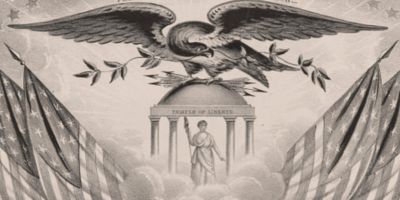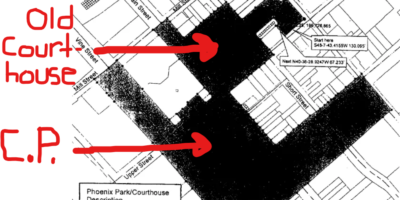Citizens United two years later
By Joy Arnold
Two years ago, I wrote an article for NoC about the then-new decision from the Supreme Court, Citizens United vs. Federal Election Commission, which removed all spending restraints on corporations regarding campaign finance. At that time, NoC readers knew what I was writing about, but if I went much deeper into the population, I got glazed-over stares.
Citizens United was far from the beginning of corporate dominance of our politics and government. The irony is, though it hasn’t always been this way, this has been going on for a long time. Piece by piece, right by right, corporations, with their limitless wealth, have hammered at the courts in order to accumulate every right they need to gain carte blanche–regardless of the cost to the environment or the price in human health and well being.
The case woke us to the fact that the so-called “precedent” on which the courts have been building a person of a corporation was in itself a fiction. The “precedent” was found in a headnote of an 1886 case–a headnote that was the work of the clerk of the Court, a former railroad executive.
The 2010 Citizens United decision further relaxed campaign finance law, allowing corporations and wealthy individuals to pour millions of dollars into the campaign coffers of political candidates. Consequently, out of fear that the dollars will go to the opposition, incumbent political leaders vote on issues not for the public good, but for the good of those who paid for their campaigns. Then, Congress members allow industry representatives to write regulations that protect corporate interests, not our air, water, and safety.
Yet we hear corporations crying: “There are too many regulations!”
Who saw it?
In the two years since the Citizens United decision, a grass roots awakening has begun. As the Occupy Movement sprung up, a broader spectrum of people also came to realize that, indeed, corporations are not people and to ascribe to them rights intended for natural persons is a fraud of the most disastrous kind. As we peel away the layers of the contrivance that corporate entities should be granted legal personhood, we’re seeing that most of us have paid no attention to the historic thread of corporate takeover of our government.
Not everyone was blind to this, though. Long before the 2010 decision, activists, corporate critics, and political analysts like Thom Hartmann, Ted Nace, David Korten, and Naomi Klein have been writing about the disintegration of democracy at the hands of corporate structures. But most of us–even undergraduate history majors—are now realizing that there was a conspicuous absence in our education: the history of the corporation.
History is peppered with warnings about the need to control corporations. The oldest quote I’ve found is from Sir Edward Coke (1549-1634): “They (corporations) cannot commit treason, nor be outlawed nor excommunicated, for they have no souls.”
If we missed Coke, surely as enamored as we are of our founders, we should have paid heed to Thomas Jefferson’s warning in 1816: “I hope we shall crush in its birth the aristocracy of our moneyed corporations which dare already to challenge our government to a trial of strength and bid defiance to the laws of our country.”
James Madison, a supporter of free commerce, in 1817 drew the line when he wrote: “There is an evil which ought to be guarded against in the indefinite accumulation of property from the capacity of holding it in perpetuity by . . . corporations. The power of all corporations ought to be limited in this respect. The growing wealth acquired by them never fails to be a source of abuses.”
I was really surprised to come across this passionate declaration from President Grover Cleveland (1885-1889): “As we view the achievements of aggregated capital, we discover the existence of trusts, combinations, and monopolies, while the citizen is struggling far in the rear or is trampled to death beneath an iron heel. Corporations, which should be the carefully restrained creatures of the law and the servants of the people, are fast becoming the people’s masters.”
In his 1912 address to the Ohio Constitutional Convention, William Jennings Bryan put it plainly when he said: “A corporation has no rights except those given it by law. It can exercise no power except that conferred upon it by the people through legislation, and the people should be as free to withhold as to give, public interest and not private advantage being the end in view.”
There are apparently volumes we should have read and taken to heart. We should have been warned that, regardless of the conveniences they offered, the instant gratification they provided, or the jobs they boasted of creating, corporations were, after all, creations of the people through their government. Corporations should always have been limited in their scope, controlled by regulation with the goal of serving the public good.
But in 1919 Henry Ford wanted to invest profits in expansion and hiring more employees, spreading the ability to profit from the industry. He was challenged in the Michigan case, Dodge v. Ford Motor Co. The court ruled that a corporation’s sole purpose is to serve its bottom line–make money for the shareholders–and the public good need not be its goal. That precedent has since ruled the day throughout the courts.
Awakening
So, we American masses were asleep at the wheel for two centuries. Now it has been two years since the Citizens United decision, which was so blatantly “legislation from the bench” that it has begun to wake the people. What gives me the idea that an awakening is afoot? There are growing glimmers of light across the country.
Governing bodies from San Francisco, Denver, and New York City have passed resolutions in favor of a constitutional amendment to declare that corporations are not people, and money is not speech. The Wisconsin state legislature is considering such a resolution. In Salt Lake City, a petition is circulating to put the issue on the ballot, and it’s already on the slate in Corvallis, Oregon.
As this article was being prepared, the Supreme Court stayed Montana’s court ruling that Citizens United would not stop the Blue Sky state from regulating its campaign finances as it has for a hundred years. It’s hard to believe that the Supreme Court Justices will throw another log on the fire that is beginning to spread. Good sense might instead suggest that the Court reverse itself, at least in part—that might throw water on the fire, but would not solve the problem, of course. What we really need is a full-scale movement to push back corporate personhood.
Various pieces of election reform and proposals for Constitutional amendments are filed in Congress at the moment, but as Thoreau said in Walden: “there are a thousand hacking at the branches of evil to one who is striking at the root.”
This isn’t a partisan issue. National polls over the last two years have shown 70-80 percent of all people perceive campaign contributions by corporations as bribes and believe that corporations have too much power. At those percentages, the issue crosses party lines.
Advocacy organizations on the environment, health, energy, education, food and drug protection–any passion you can name—are realizing they will never make significant progress until the root of corporate control is severed.
Move to amend
The radical change we need will require a major, dramatic grassroots uprising. We have a once in a lifetime opportunity to make a future with a government of, for, and by the people—this time for real. Re-educating ourselves is absolutely necessary. Concurrent with learning the facts, we must commit to the hard work of grassroots organizing for which numbers are crucial. Kentuckians thinking on this issue now have a vehicle to channel their efforts for reform.
In mid-November, Central Kentucky Move to Amend (CKYMTA) was organized as an affiliate of the national coalition building organization, Move to Amend (MTA). Today there are more than 70 affiliates around the country. On January 20, some 60 Move to Amend Kentuckians commemorated the second anniversary of Citizens United through an “Occupy the Courts” demonstration at Lexington’s Federal Court House. There were over 130 such demonstrations across the country.
MTA’s long-range goal is an amendment to the Constitution declaring unequivocally that corporations are not people and money is not speech. Join the movement.
The next meeting of CKYMTA will be Sunday, March 18, 1:15P.M. at the downtown branch of Lexington’s Public Library, fourth floor conference room. We will be developing plans for the next eight months.
All interested folks are invited. Please RSVP and get details by emailing ckymta@gmail.com. You can also check us out at www.ckymta.org where you can move to our blog or to the national website.




Leave a Reply